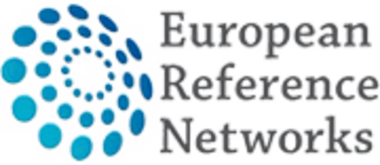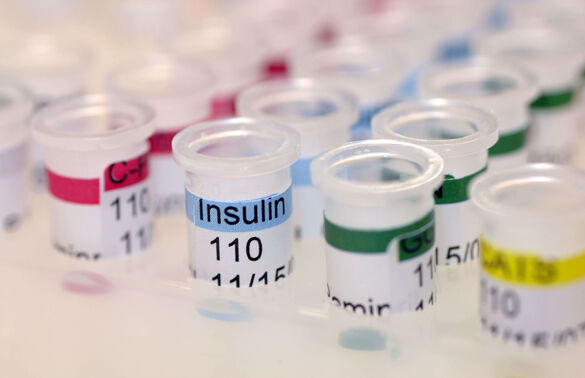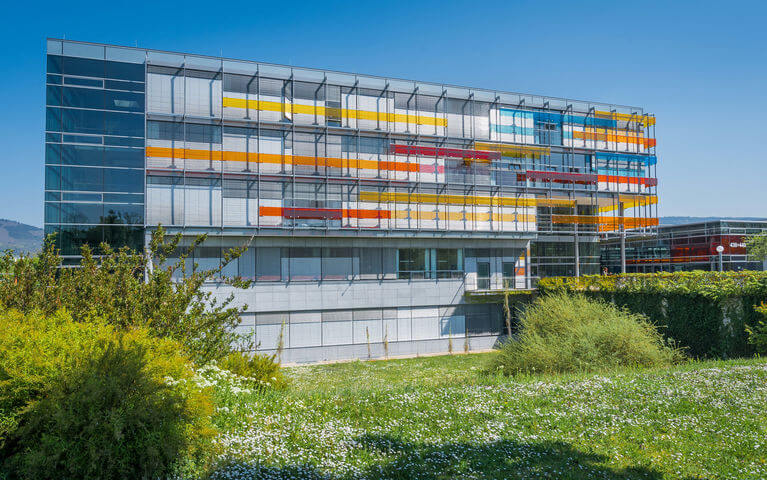University Children´s Hospital
A brief profile
The University Children`s hospital, founded more than 160 years ago, covers the full spectrum of Pediatrics. It is a comprehensive medical center for children and adolescents with 4 independent clinics, 212 beds including 36 beds for intensive care patients and an additional 15 beds for day care patients. Available are the highest level of expertise for all medical problems of children and adolescents as well as almost all, even the newest and most advanced procedures and treatment options.
Continuous outstanding results often including new therapies from high level basic and clinical research are recognized worldwide. Specifically the following major fields with recognized supra-regional expertise and services are well recognized in Germany and beyond.
Set of specification
core competencies and disease focuses
The fields are recognized as supraregional expertise and services
- Pediatric Gastroenterology and Hepatology (Director: Dr. A. Fichtner)
A wide range of interventional techniques are practiced such as diagnostic and interventional endoscopy of the upper and lower GI tract and liver biopsies. A special interdisciplinary team organizes the diagnosis and treatment of end-stage liver disease. Further areas of expertise are the treatment of patients with inflammatory bowel disease and disorders of the pancreas. - Pediatric Nephrology (Director: Prof. Dr. F. Schaefer)
One of the largest and most prestigious pediatric nephrology centers worldwide, reference center for a population of ≈ 10-20 million. The Division harbors a specialized pediatric dialysis unit providing various blood purification techniques including hemo- and peritoneal dialysis, plasmapheresis, immunoadsorption and liver dialysis. One of the largest pediatric renal transplantation programs in Europe is run in collaboration with the Division of Visceral Transplantation at the Department of Surgery, and complex urological disorders are managed in collaboration with experienced pediatric urologists at the Department of Urology. - Pediatric Neurology and Metabolic Diseases (Director: Prof. Dr. med. St. Kölker)
An international center for the diagnosis and treatment of seizure disorders, neurometabolic diseases and neuromuscular diseases. There also exists a unit of developmental neurology for the diagnosis and treatment of infants with suspected or proven brain damage (center for social pediatrics). A multi-professional, interdisciplinary team of physicians and scientists, technicians, nurses, dieticians, psychologists and social workers cares for patients with inborn errors of metabolism and their families. The hospital serves as a national and international reference center. It is equipped with a separate ward for patients with metabolic and endocrinological problems, a huge outpatient clinic, and one of the largest laboratories worldwide for the biochemical and molecular diagnosis of nearly all inborn metabolic diseases including newborn screening for Southwest Germany. - Pediatric Endocrinology and Diabetology (Director: Prof. Dr. M. Bettendorf)
A team consisting of physicians, nurses, dieticians, social workers, psychologists and laboratory technicians offers expertise in all areas of Pediatric Endocrinology and Diabetology including disorders of growth, puberty, sex differentiation, glucose metabolism and obesity, bone and mineral metabolism, the pituitary/hypothalamus, the thyroid, the adrenal, and the gonads, and emergency care. Hormone measurements are performed in a routine and research laboratory. A close relationship exists with other relevant specialties such as nuclear medicine, imaging facilities, surgery and laboratory facilities. - Pediatric Cardiology (Director: Prof. Dr. M. Gorenflo)
The department offers the complete spectrum of cardiological diagnosis and treatment for neonates, infants, children and adults with congenital heart disease. Outpatient services include: Fetal echocardiography; standard echocardiography (2D, PW, CW, colour-Doppler); trans-esophageal echocardiography; MR and CT – studies in patients with cardiovascular and/or cardio-pulmonary disease; Tissue-Doppler analysis of hearts in patients with cardiac disease. A special cath-lab enables diagnosis and interventional treatment of patients with congenital heart disease in all age groups on a daily basis. - Oncology, Hematology and Immunology (Director: Prof. Dr. Dr. A. Kulozik)
Treatment of children and adolescents with cancer (leukemia, lymphoma, solid tumors especially brain tumors) and serious blood disorders (thalassemia, sickle cell disease, disorders of blood coagulation). We directly provide complex medical care to children and adolescents with these diseases and co-ordinate the interdisciplinary treatment approach that involves other disciplines such as radiotherapy, pediatric surgery, orthopedic surgery, and neurosurgery including new experimental protocols. As a second focus, we concentrate on patients with complex lung diseases (cystic fibrosis, asthma) and inherited or acquired immunodeficiency. - Epileptology
Based on a long tradition, we care for all children and adolescents with epilepsy and related disorders, including movement disorders, autism spectrum disorders, and non-epileptic differential diagnoses. In a certified monitoring unit, children with epilepsies receive comprehensive diagnostics and are prepared for epilepsy surgery as well as for individual treatment trials. We are interested in the understanding of severe epilepsies and epileptic encephalopathies as well as in clinical and treatment aspects with the goal of early translation of research into clinical practice.

Key figures that are unique in international comparison
The newborn screening laboratory analyzes more than 140,000 newborns each year with the most advanced spectrum of analyzes, and another 15,000 national and international patients are analyzed for the biochemical and molecular diagnosis of all inborn metabolic diseases.
Internationally recognized certifications and distinctions

The Pediatric Nephrology and Metabolic Disease Divisions are certified European Reference Centers for rare kidney and metabolic diseases, respectively. The Division for Pediatric Neurology and Metabolic Diseases is recognized as the first authorized European Training Center for Pediatric Metabolic Medicine.
Current international cooperation
The Cooperative EuRopean Paediatric TransplAnt INitiative LIver (CERTAIN-Li) registry is coordinated from the University Childrens Hospital. The registry is an European effort for clinical research, quality assurance and improved patient care purposes in the field of paediatric liver transplantation. Through cooperation with national and international partners, relevant questions on immunological, histo-pathological, infectious and clinical issues around and after liver transplantation are dealt with. The European Reference Centers for Pediatric Nephrology and Metabolic Diseases regularly receive challenging clinical cases from abroad, mainly from institutions in Central and Eastern Europe, Central Asia and the Arab world. The pediatric nephrology division coordinates the European Reference for Rare Kidney Diseases (ERKNet), organizing virtual consultations, education and training activities, clinical guideline development and performance monitoring programs for expert centers in rare kidney diseases.
Members of the Division also lead several highly successful international research consortia such as the European Study Consortium for Chronic Kidney Disorders (ESCAPE Network), the International Pediatric Dialysis Network (IPDN) and the Cooperative European Paediatric Renal Transplant Initiative (CERTAIN, ).
Additional major international cooperations:
- Urea cycle disorders consortium (UCDC)
- European registry and network for intoxication type metabolic diseases (EIMD)
- European network and registry for homocystinurias and methylation defects (E-HOD)
- International working group on neurotransmitter-related disorders (iNTD)
- European Reference Network for Hereditary Metabolic Disorders (MetabERN)
- EuroEPINOMICS RES (Rare Epilepsy Syndromes) Consortium
- Universitäts-Kinderspital Zürich (Prof. Dr. Matthias Baumgartner)
- Children’s National Health System, Washington DC (Prof. Mark Batshaw, Prof. Marshall Summar)
- Boston Children’s Hospital, Harvard Medical School, Boston (Prof. Sahin, Dr. Ebrahimi-Fakhari)
Special indicators of interdisciplinary collaboration
The University Childrens Hospital is the heart of the Center for Rare Diseases University Clinic Heidelberg. An extensive network could be established which, through access to precise diagnostics and therapy, interdisciplinary case management, case studies, and structured support from specific expert panels, has become able to substantially improve the quality of interdisciplinary diagnostics and treatment of rare diseases.
The participation of experts in cross-site case studies ensures that patients benefit from all currently available expertise in the field of undiagnosed as well as specific rare diseases. Innovative genetic diagnostics is carried out at the indication of an expert panel and with the validation of the relevant physicians so ensuring the highest quality.
Research focuses
- Biomarker research in renal and liver transplantation. The main topic is pediatric transplant immunology in close collaboration with the Institute for Immunology, Heidelberg. Our research interests focus on the investigation and development of new innovative non-invasive biomarkers for graft rejection, graft fibrosis and tolerance development.
- Inherited kidney diseases: Genetic basis, molecular mechanisms and innovative therapeutic approaches.
- Progression of chronic kidney disease in children: Risk factors, mechanisms and therapeutic modification.
- Pediatric renal replacement therapy (dialysis, transplantation): Epidemiology, complications, outcomes.
- Pilot newborn screening programs
- Next generation sequencing: elucidating the molecular origin of rare neurologic diseases, including pediatric epilepsies. International studies on genetic and clinical aspects of epileptic encephalopathies.
- Multi-center longitudinal observational studies focusing on individuals with inherited metabolic diseases (UCDC, E-IMD, E-HOD, iNTD, U-IMD, LZO/NBS2020)
- Metabolic profiling of rare neurologic diseases (NeuroMetabolom, MetabRND)
- Disorders of glycosylation: improving diagnosis and therapy
- Intoxication type metabolic diseases (urea cycle disorders, organic aciduria): unravelling pathomechanisms and identifying targets for innovative therapies
- Neurotransmitter-related disorders: deep phenotyping, identifying targets for innovative therapies using iPSCs and animal models
- Congenital disorders of intracellular trafficking: unravelling molecular origin, deep phenotyping, pathophysiology, therapy
- Carnosine metabolism: impact on diabetic nephropathy
Ongoing studies with international relevance
- 4C: Cardiovascular Comorbidity in Children with Chronic Kidney Disease Study – European observational study
- PREDICT Trial: Antibiotic Prophylaxis and REnal Damage In Congenital Abnormalities of the Kidney and Urinary Tract - Randomized Clinical Trial
- ERK-REG: European Registry for Rare Kidney Diseases
- CERTAIN: Cooperative European Paediatric Renal Transplant Initiative – International registry
- IPDN: International Pediatric Dialysis Network – Global registry PodoNet: International Registry Study for Congenital and Steroid Resistant Nephrotic Syndrome
- U-IMD: Unified Registry of Inherited Metabolic Diseases (European Commission via Chafea)
- The concert of dolichol-based glycosylation: from molecules to disease models (DFG research group)
- Newborn screening and Metabolic Medicine 2020 (Dietmar Hopp Foundation)
- Impact of carnosine metabolism on diabetic nephropathy (project C05 of DFG-funded Collaborative Research Center 1118)

Internationally recognized certifications and distinctions
Division of Pediatric Neurology and Metabolic Medicine
- Providing comprehensive capacities for the diagnostics and treatment of pediatric epilepsies and associated comorbidities
- Beeing Organized in national and European networks for genetic epileptic encephalopathies aiming at early translation of research aspects into clinical treatment and care of patients
- Coordinating studies on genetic and structural epilepsy syndormes
- Housing the largest specialized laboratory for inherited metabolic diseases including newborn screening for Southwest Germany
- Coordinating large-scale studies and translational projects for inherited metabolic diseases, fostering translation of research into practice and harmonization of diagnosis, therapy, and care
Publications with international reach
Fichtner A, Süsal C, Schröder C, Höcker B, Rieger S, Waldherr R, Westhoff JH, Sander A, Dragun D, Tönshoff B. Association of angiotensin II type 1 receptor antibodies with graft histology, function and survival in paediatric renal transplant recipients. Nephrol Dial Transplant. 2018 Jun 1;33(6):1065-1072. |
Chesnaye NC, Schaefer F, Bonthuis M, et al. Mortality risk disparities in children receiving chronic renal replacement therapy for the treatment of end-stage renal disease across Europe. Lancet 2017; 389:2128-2137 |
Devuyst O, Knoers NVA, Remuzzi G, Schaefer F. Rare inherited kidney diseases: Challenges, opportunities and perspectives. Lancet 2014; 383:1844-59 |
Lemaire M, Frémeaux-Bacchi V, Schaefer F, .... Recessive mutations in DGKE cause atypical hemolytic-uremic syndrome. Nat Genet 2013; 45:531-6. |
Lapeyraque AL, Malina M, Fremeaux-Bacchi V, ..., Schaefer F. Eculizumab in severe Shiga-toxin-associated HUS. New Engl J Med 2011; 364: 2561-3. |
Wühl E, Trivelli A, Matteucci MC, ..., Schaefer F. Strict blood pressure control and progression of renal failure in children. N Engl J Med 2009; 361: 1639-50. |
| Anikster Y, Haack TB, Vilboux T, Pode-Shakked B, Thöny B, Shen N, Guarani V, Meissner T, Mayatepel E, Trefz FK, Marek-Yagel D, Martinez A, Huttlin EL, Paulo JA, Berutti R, Benoist JF, Imbard A, Dorboz I, Heimer G, Landau Y, Ziv-Strasser L, Malicdan MCV, Gemperle-Britschgi C, Cremer K, Engels H, Meili D, Keller I, Bruggmann R, Strom TM, Meitinger T, Mullikin JC, Schwartz G, Ben-Zeev B, Gahl WA, Harper JW, Blau N, Hoffmann GF, Prokisch H, Opladen T, Schiff M. Biallelic mutations in DNAJC12 cause hyperphenylalaninemia, dystonia, and intellectual disability. Am J Hum Genet 2017;100:257-266 |
Boy N, Mengler K, Thimm E, Schiergens KA, Marquardt T, Weinhold N, Marquardt I, Das AM, Freisinger P, Grünert SC, Vossbeck J, Steinfeld R, Baumgartner MR, Beblo S, Dieckmann A, Näke A, Lindner M, Heringer J, Hoffmann GF, Mühlhausen C, Maier EM, Ensenauer R, Garbade SF, Kölker S. Newborn screening, a disease-changing intervention for glutaric aciduria type 1. Ann Neurol 2018;83:970-979 |
Breuer M, Guglielmi L, Zielonka M, Hemberger V, Kölker S, Okun JG, Hoffmann GF, Carl M, Sauer SW, Opladen T. QDPR homologues in Danio rerio regulate melanin synthesis, early gliogenesis, and glutamine homeostasis. PLoS One. 2019 Apr 17;14(4):e0215162. |
Cullup T, Kho AL, Dionisi-Vici C, Brandmeier B, Smith F, Urry Z, Simpson MA, Yau S, Bertini E, McClelland V, Al-Owain M, Koelker S, Koerner C, Hoffmann GF, Wijburg FA, ten Hoedt AE, Rogers RC, Manchester D, Miyata R, Hayashi M, Said E, Soler D, Kroisel PM, Windpassinger C, Filloux FM, Al-Kaabi S, Hertecant J, Del Campo M, Buk S, Bodi I, Goebel HH, Sewry CA, Abbs S, Mohammed S, Josifova D, Gautel M, Jungbluth H. Recessive mutations in EPG5 cause Vici syndrome, a multisystem disorder with defective autophagy. Nat Genet. 2013 Jan;45(1):83-7. |
Danhauser K, Sauer SW, Haack TB, Wieland T, Staufner C, Graf E, Zschocke J, Strom TM, Traub T, Okun JG, Meitinger T, Hoffmann GF, Prokisch H, Kölker S. DHTKD1 mutations cause 2-aminoadipic and 2-oxoadipic aciduria. Am J Hum Genet. 2012 Dec 7;91(6):1082-7. |
Garbade SF, Shen N, Himmelreich N, Haas D, Trefz FK, Hoffmann GF, Burgard P, Blau N. Allelic phenotype values: a model for genotype-based phenotype prediction in phenylketonuria. Genet Med. 2019 Mar;21(3):580-590. |
Gdynia G, Sauer SW, Kopitz J, Fuchs D, Duglova K, Ruppert T, Miller M, Pahl J, Cerwenka A, Enders M, Mairbäurl H, Kamiński MM, Penzel R, Zhang C, Fuller JC, Wade RC, Benner A, Chang-Claude J, Brenner H, Hoffmeister M, Zentgraf H, Schirmacher P, Roth W. The HMGB1 protein induces a metabolic type of tumour cell death by blocking aerobic respiration. Nat Commun. 2016 Mar 7;7:10764. |
Haack TB, Staufner C, Köpke MG, Straub BK, Kölker S, Thiel C, Freisinger P, Baric I, McKiernan PJ, Dikow N, Harting I, Beisse F, Burgard P, Kotzaeridou U, Kühr J, Himbert U, Taylor RW, Distelmaier F, Vockley J, Ghaloul-Gonzalez L, Zschocke J, Kremer LS, Graf E, Schwarzmayr T, Bader DM, Gagneur J, Wieland T, Terrile C, Strom TM, Meitinger T, Hoffmann GF, Prokisch H. Biallelic mutations in NBAS cause recurrent acute liver failure with onset in infancy. Am J Hum Genet 2015;97:163-169 |
Kopajtich R, Murayama K, Janecke AR, Haack TB, Breuer M, Knisely AS, Harting I, Ohashi T, Okazaki Y, Watanabe D, Tokuzawa Y, Kotzaeridou U, Kölker S, Sauer S, Carl M, Straub S, Entenmann A, Gizewski E, Feichtinger RG, Mayr JA, Lackner K, Strom TM, Meitinger T, Müller T, Ohtake A, Hoffmann GF, Prokisch H, Staufner C. Biallelic IARS mutations cause growth retardation with prenatal onset, intellectual disability, muscular hypotonia, and infantile hepatopathy. Am J Hum Genet 2016;9:414-422 |
Lemke JR, Geider K, Helbig KL, Heyne HO, Schütz H, Hentschel J, Courage C, Depienne C, Nava C, Heron D, Møller RS, Hjalgrim H, Lal D, Neubauer BA, Nürnberg P, Thiele H, Kurlemann G, Arnold GL, Bhambhani V, Bartholdi D, Pedurupillay CR, Misceo D, Frengen E, Strømme P, Dlugos DJ, Doherty ES, Bijlsma EK, Ruivenkamp CA, Hoffer MJ, Goldstein A, Rajan DS, Narayanan V, Ramsey K, Belnap N, Schrauwen I, Richholt R, Koeleman BP, Sá J, Mendonça C, de Kovel CG, Weckhuysen S, Hardies K, De Jonghe P, De Meirleir L, Milh M, Badens C, Lebrun M, Busa T, Francannet C, Piton A, Riesch E, Biskup S, Vogt H, Dorn T, Helbig I, Michaud JL, Laube B, Syrbe S. Delineating the GRIN1 phenotypic spectrum: A distinct genetic NMDA receptor encephalopathy. Neurology 2016;86:2171-2178 |
Lenz D, McClean P, Kansu A, Bonnen PE, Ranucci G, Thiel C, Straub BK, Harting I, Alhaddad B, Dimitrov B, Kotzaeridou U, Wenning D, Iorio R, Himes RW, Kuloglu Z, Blakely EL, Taylor RW, Meitinger T, Kölker S, Prokisch H, Hoffmann GF, Haack TB, Staufner C. SCYL1 variants cause a syndrome with low γ-glutamyl-transferase cholestasis, acute liver failure, and neurodegeneration (CALFAN). Genet Med 2018;10:1255-1265 |
| Posset R, Gropman AL, Nagamani SCS, Burrage LC, Bedoyan JK, Wong D, Berry GT, Baumgartner MR, Yudkoff M, Zielonka M, Hoffmann GF, Burgard P, Schulze A, McCandless SE, Garcia-Cazorla A, Seminara J, Garbade SF, Kölker S; UCDC and the E-IMD consortia study group. Impact of diagnosis and therapy on cognitive function in urea cycle disorders. Ann Neurol. 2019 Apr 24. doi: 10.1002/ana.25492. |
Syrbe S, Hedrich UBS, Riesch E, Djémié T, Müller S, Møller RS, Maher B, Hernandez-Hernandez L, Synofzik M, Caglayan HS, Arslan M, Serratosa JM, Nothnagel M, May P, Krause R, Löffler H, Detert K, Dorn T, Vogt H, Krämer G, Schöls L, Mullis PE, Linnankivi T, Lehesjoki AE, Sterbova K, Craiu DC, Hoffman-Zacharska D, Korff CM, Weber YG, Steinlin M, Gallati S, Bertsche A, Bernhard MK, Merkenschlager A, Kiess W; EuroEPINOMICS RES consortium, Gonzalez M, Züchner S, Palotie A, Suls A, De Jonghe P, Helbig I, Biskup S, Wolff M, Maljevic S, Schüle R, Sisodiya SM, Weckhuysen S, Lerche H, Lemke JR. De novo loss- or gain-of-function mutations in KCNA2 cause epileptic encephalopathy. Nat Genet 2015;47:393-399 |
Syrbe S, Harms FL, Parrini E, Montomoli M, Mütze U, Helbig KL, Polster T, Albrecht B, Bernbeck U, van Binsbergen E, Biskup S, Burglen L, Denecke J, Heron B, Heyne HO, Hoffmann GF, Hornemann F, Matsushige T, Matsuura R, Kato M, Korenke GC, Kuechler A, Lämmer C, Merkenschlager A, Mignot C, Ruf S, Nakashima M, Saitsu H, Stamberger H, Pisano T, Tohyama J, Weckhuysen S, Werckx W, Wickert J, Mari F, Verbeek NE, Møller RS, Koeleman B, Matsumoto N, Dobyns WB, Battaglia D, Lemke JR, Kutsche K, Guerrini R: Delineating SPTAN1-associated phenotypes: from isolated epilepsy to encephalopathy with progressive brain atrophy. Brain 2017;140:2322-2336 |
Zielonka M, Breuer M, Okun JG, Carl M, Hoffmann GF, Kölker S. Pharmacologic rescue of hyperammonemia-induced toxicity in zebrafish by inhibition of ornithine aminotransferase. PloS One 2018;13 |


